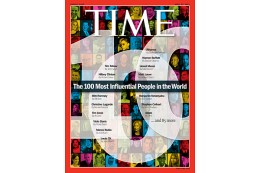
This year, TIME’s annual list of the 100 most influential people in the world celebrates the female CEO of IBM, the female head of the IMF, and the female president of Germany, among other powerful women. And yet, 220 years after Mary Wollstonecraft’s A Vindication of the Rights of Women and 92 years since women were granted full suffrage in the U.S., men continue to predominate: there are 61 men to only 38 women this year (and one genderless association—the hacktivist group Anonymous.)
The road to female equality has not only been long, but it doesn’t run straight. The annual process of compiling this list highlights switchbacks and blind alleys. Women in wealthy, stable countries often imagine themselves as more empowered than their counterparts elsewhere, but wealth and stability sometimes translates into sclerosis. Meanwhile, turbulence creates opportunities for change, good and bad. Last year, in the tumult of the Arab spring, female leaders bloomed. Many now fear new repression and an encroaching Arab winter.
(MORE: The War On Women Begins With Girls)
One of the 2012 TIME 100 honorees is Samira Ibrahim, an Egyptian who was detained during the Tahrir Square protests that toppled her country’s regime and subjected to a humiliating “virginity test.” She sued and the tests were banned. Several other women on this year’s list emerged from countries witnessing rapid change: Chinese self-made billionaire Chen Laiwa, Brazilian president Dilma Rousseff and Fatou Bensouda, the Gambian lawyer who in June takes up her post as Chief Prosecutor of the International Criminal Court. Germany’s redoubtable Angela Merkel, on the list for the 5th time, may preside over the most stolid of Old European nations, but she grew up in East Germany and launched into politics as the state, and the Wall that symbolized its repression, crumbled.
The men around Merkel routinely underestimated her, allowing her to rise almost unobserved until she stepped up to lead her political party. If being underestimated and overlooked could always be turned to advantage, women would be sitting pretty. The world’s largest media monitoring study, conducted in 2010, found that women featured in only 24% of stories. That’s a vicious cycle, condemning half the world to comparative obscurity. Editors overlook women because editors overlook women.
(MORE: Hilary Rosen Was Right: Ann Romney Is Out of Touch With Most Women)
So the rising proportion of women on the TIME 100 is not only a reflection of external forces but also of TIME’s editorial policy to make sure we don’t fall into that trap. Inevitably we find some of the strongest female candidates in fields traditionally open to female participation such as the arts, entertainment and fashion. Still, who would do anything other than cheer the talents of these 2012 honorees: singers Adele and Rihanna, actors Jessica Chastain, Clare Danes, Viola Davis and Tilda Swinton and designer Sarah Burton?
We look for trailblazers and try to search out inspiring women who have asserted power, not inherited it. Some readers may blow raspberries at choices that do not meet this criterion (though they would never question the inclusion of Kim Jong-un). The Queen, celebrating the 60th year of a long and remarkable reign, serves as head of state in 16 countries and presides over the Commonwealth of 54 nations. Alice Walton, the Wal-Mart heiress, founded the Crystal Bridges Museum of American Art in Arkansas. Critics will complain that one was born with a silver scepter in her mouth, the other with a bulk order of cutlery in hers.
(MORE: Why Men Are Attracted to High-Earning Women)
Pippa Middleton, almost certainly the most controversial addition to this year’s TIME 100, represents the flipside of the visibility debate, better known from the back than the front. She owes her celebrity to her sister Kate. Her sister owes hers to a famous husband. That was a criticism once leveled at another 2012 honoree, Hillary Clinton, but no more. Clinton has disproved those critics. To exclude females who attain influence by routes that make us uncomfortable is not to move closer to equality, but to disadvantage women further. The TIME 100 reminds us that women have reached great heights, but still have more mountains to scale.
MORE: Women, Money and Power
